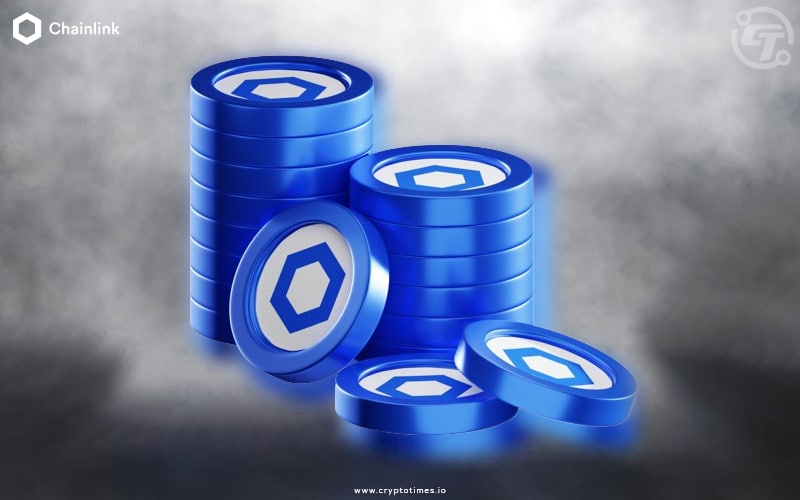In the fast-paced realm of blockchain technology, various revolutionary concepts have emerged, reshaping the way we perceive and interact with digital assets. Among these groundbreaking developments, the concept of decentralized oracles has gained significant attention, with Chainlink standing at the forefront of this innovative landscape.
Blockchain technology alone has limitations when it comes to accessing and utilizing real-world data securely and reliably. This is where Chainlink comes into play, bridging the gap between smart contracts and external data sources through its decentralized oracle network. In this article, we will explore the history of Chainlink, from its conceptualization to its realization, and delve into the unique capabilities it brings to the world of blockchain technology.
In this article, we will explain the fundamental concept of Chainlink Oracle and how it can boost power of blockchain technology. Also, we will discuss the difference between Chainlink’s native token LINK and Bitcoin in context of investment.
So, let’s begin.
What is Chainlink Oracle?
Chainlink, launched in 2017, is a decentralized oracle network built on blockchain technology. Oracles serve as intermediaries between blockchains and external systems, enabling smart contracts to execute using data inputs and outputs from the blockchain. Unlike traditional oracles that are centralized, Chainlink introduces a decentralized approach through “hybrid smart contracts.” This approach facilitates the secure and efficient transfer of data to and from blockchains.
In the Chainlink network, LINK tokens play a crucial role. They are used to incentivize network operators who retrieve data from off-chain sources, format it into accessible formats, and perform off-chain computations. These operators are part of a system of nodes that operate according to predefined protocols. To participate as node operators, individuals must stake or lock a specific number of their LINK tokens. Node operators have the flexibility to set their own fees based on the demand for the off-chain resources they provide.
Features of Chainlink Oracle
Chainlink is a cutting-edge blockchain technology that revolutionizes the way data is securely shared, computations are performed, and outputs are generated. With its advanced features and robust infrastructure, Chainlink is paving the way for the seamless integration of blockchain and real-world data. Let’s explore some of the key features that make Chainlink stand out in the world of oracles:
1. Supporting Decentralized Data Feeds
Chainlink excels in securely collecting and processing data from multiple sources. Its decentralized data feeds enable hybrid smart contracts to access real-time, accurate, and reliable information from various providers. This ensures the trustworthiness and tamper-proof nature of smart contract inputs, enhancing the security and integrity of the blockchain ecosystem.
2. Providing Verifiable Sources of Randomness
Chainlink’s verifiable sources of randomness are invaluable for applications like gaming platforms. They provide a robust and transparent mechanism for generating random numbers, ensuring fair and unbiased outcomes. By leveraging Chainlink’s secure randomness features, developers can build provably fair games and applications that inspire trust among users.
3. Enabling Automation
Chainlink’s smart contract capabilities extend beyond data retrieval, empowering enterprises to automate critical functions and event-driven tasks. By leveraging Chainlink-powered smart contracts, businesses can streamline complex processes, eliminate intermediaries, and ensure seamless operations within a decentralized environment. With Chainlink, enterprises unlock enhanced efficiency, reliability, and scalability.
4. Supporting Cross-Blockchain Interoperability
Chainlink acts as a bridge, supporting cross-blockchain interoperability. It enables seamless communication and interaction, allowing for the exchange of messages, tokens, and actions between different blockchain networks. This fosters collaboration and maximizes the potential of blockchain technology.
Furthermore, Chainlink also striving to connect web 2 platforms with web 3 technology. Recently It has introduced data bridge ‘function’ to connect web2 with web3.
Why Are Oracles Essential for Blockchains?
Oracles play a vital role in bridging decentralized networks and real-world data in the blockchain ecosystem. They act as intermediaries, extracting information from external databases and reliably delivering it to the blockchain. This opens up numerous opportunities, such as seamless supply-chain tracking and integration of traditional systems with decentralized networks.
Oracles enable blockchains to access and utilize real-world data, expanding their capabilities beyond the confines of their own network. They serve as the internet connection for blockchains, unlocking their full potential by facilitating the interaction with a vast array of external information.
Adoption and Use Cases of Chainlink in the Cryptocurrency and Broader Industries
Chainlink, as a decentralized oracle network, has witnessed significant adoption and integration across various sectors of the cryptocurrency industry and beyond. Its unique capabilities have addressed the limitations of smart contracts, enabling them to interact with real-world data and unlocking a wide array of use cases. In this section, we will explore the current adoption and prominent use cases of Chainlink.
1. Decentralized Finance (DeFi)
One of the most notable areas of adoption for Chainlink is in the realm of decentralized finance (DeFi). DeFi applications rely on accurate and reliable data to execute financial transactions and smart contracts. Chainlink’s decentralized oracle network acts as a secure bridge, providing real-time and tamper-proof data inputs. This integration ensures the integrity of DeFi protocols, enabling functionalities such as decentralized lending and borrowing, yield farming, decentralized exchanges, and stablecoin management.
2. Supply Chain Management
Chainlink’s oracle technology has found applications in supply chain management, where transparency and traceability are crucial. By connecting smart contracts with external data sources, Chainlink allows for real-time tracking of goods, verification of authenticity, and monitoring of supply chain events.
3. Insurance
Smart contracts powered by Chainlink oracles enable automated and reliable insurance claims processing by securely retrieving and verifying relevant external data, such as weather conditions, market prices, and other critical factors. This reduces the need for manual intervention, speeds up claims settlement, and improves the accuracy of risk assessments.
4. Gaming and NFTs
The gaming and non-fungible token (NFT) sectors have witnessed the integration of Chainlink’s oracle technology to enhance in-game economies and ensure the uniqueness and authenticity of digital assets.
5. Real-World Data Integration:
Chainlink’s versatile oracle network enables the integration of real-world data into smart contracts across a wide range of industries. This includes weather data for agricultural applications, market data for financial analysis, IoT data for smart city initiatives, and much more.
Limitations of Smart Contracts and How Chainlink Solves Them
Current smart contract model holds some limitations.
1. Data Connectivity
Smart contracts, by design, operate within the blockchain ecosystem and lack direct connectivity to external data sources. This restricts their ability to retrieve real-time information required for decision-making and automated execution.
2. Data Reliability
Verifying the accuracy and reliability of external data is crucial for smart contract functionality. Without a trusted and decentralized solution, smart contracts may be exposed to data manipulation or inaccuracies, potentially leading to undesired outcomes.
3. Interoperability
Smart contracts deployed on different blockchain networks face challenges in accessing and interpreting data across multiple systems. Achieving seamless interoperability is essential to enable the broader adoption and scalability of smart contracts.
Chainlink solves these limitations by providing a decentralized oracle network that acts as a bridge between smart contracts and external data sources. Chainlink oracles securely retrieve and verify real-world data, ensuring its integrity before feeding it into smart contracts. By doing so, Chainlink enables smart contracts to interact with real-world information, expanding their capabilities and use cases.
Advantages of Chainlink Oracle
Chainlink’s Oracle network offers a wide range of advantages that solidify its position as a leader in the Oracle landscape. By seamlessly connecting blockchains with off-chain data sources, Chainlink addresses the Oracle Problem and introduces trustless communication between these two domains. Let’s explore the key advantages of Chainlink:
1. Trustless Bridge between Blockchains and Off-Chain Data Sources
Chainlink’s Oracle network is a trustworthy bridge that enables secure access to off-chain data for blockchains. It solves the Oracle Problem by verifying external data used in smart contracts. With a decentralized approach, Chainlink ensures accurate, reliable, and integral data for blockchain applications requiring real-world information.
2. Proven Track Record and Security
Chainlink has a proven track record, securing billions of dollars in top decentralized finance (DeFi) protocols. Its battle-tested infrastructure and strong security measures have earned the trust of developers and users. With the capability to handle large-scale transactions securely, Chainlink is a reliable choice for critical financial applications.
3. Continuous Innovation and Feature Expansion
Chainlink continues to lead in the ever-changing blockchain industry. The release of the Chainlink 2.0 whitepaper in 2021 highlights its commitment to constant improvement. With features like Verifiable Random Functions (VRFs), Off-chain Reporting (OCR), Keepers, and the Cross-Chain Interoperability Protocol (CCIP), Chainlink expands its capabilities and empowers developers to create advanced and interconnected blockchain applications.
4. Dominant Market Position
Chainlink was an early leader in the decentralized oracle network sector and has established itself as the dominant player. In the 2021 bull market, it secured over $70 billion in value across multiple DeFi networks, showcasing its widespread adoption and trust among the blockchain community. This dominance makes Chainlink the preferred choice for developers and enterprises seeking reliable and secure data integration.
5. Potential for Future Growth
With the increasing adoption of smart contract technology in traditional systems, Chainlink is well-positioned to benefit. The growing cryptocurrency industry and the expanding usage of DeFi provide significant opportunities for Chainlink’s continued growth. As a reputable industry leader, Chainlink is poised to play a pivotal role in shaping the future of blockchain technology.
6. Blockchain-Agnostic and Extensive Network Coverage
Chainlink is built to be compatible with different blockchains, allowing seamless integration. It currently operates on Ethereum Layer 2 solutions like Arbitrum and Optimism, as well as other popular blockchains including Polygon, Binance Smart Chain, Solana, and Avalanche. This extensive network coverage ensures that developers and enterprises can utilize Chainlink’s oracle services irrespective of the underlying blockchain technology.
Comparison between Chainlink’s LINK and Bitcoin
1. Purpose and Functionality
Bitcoin serves as a digital alternative to money and focuses on recording and transferring ownership of the cryptocurrency through a decentralized network and blockchain technology. On the other hand, Chainlink utilizes blockchain technology to facilitate smart contracts, which are automated contracts executed directly between individuals without the need for intermediaries. Chainlink addresses the challenge of accessing external information required to complete smart contracts by incentivizing information providers (oracles) through a reputation system and rewarding them with LINK tokens.
2. Transaction Type
Bitcoin transactions involve the transfer of ownership of the cryptocurrency, which is recorded on the public and permanent blockchain ledger. In contrast, Chainlink’s transactions revolve around the execution of smart contracts, where the fulfillment of conditions within the contract triggers specific actions.
3. Token Usage
Bitcoin’s native cryptocurrency is Bitcoin itself (BTC), used as a medium of exchange and store of value. In contrast, Chainlink has its own cryptocurrency called LINK, which is used to incentivize and compensate information providers (oracles) for their services in facilitating accurate data for smart contracts.
4. Limited Supply
Both Bitcoin and LINK have a limited supply. Bitcoin has a maximum supply of 21 million coins, and once this limit is reached, no more BTC will be minted. Similarly, Chainlink has a maximum supply of one billion LINK tokens, after which no additional tokens will be created.
Which is better investment option between BTC and LINK?
The question of whether Chainlink or Bitcoin is the better investment is a difficult one to answer. Both have their advantages and disadvantages, and it ultimately depends on your investment goals and risk tolerance.
If you are looking for a long-term investment and are willing to take on more risk, Bitcoin may be the better choice. It has proven to be a good store of value, and its price has been steadily increasing over the years. However, it is also highly volatile, and its price can fluctuate dramatically in a short period. Furthermore, you can visit xBitcoin Club to explore investment opportunity in Bitcoin.
If you are looking for a more specialized investment and are interested in the potential of smart contracts, Chainlink may be the better choice. It has a specific use case, which is to connect smart contracts to external data sources, and it has a strong team behind it. However, it is still a relatively new project, and its price can be highly volatile.
Also Read: The Influence of Blockchain on Financial Services and Beyond
Conclusion:
Chainlink has emerged as a leader in the realm of decentralized oracles, bridging the gap between smart contracts and real-world data. Its decentralized approach and robust infrastructure have propelled its adoption in various sectors, including decentralized finance, supply chain management, insurance, gaming, and more.
In comparison, Bitcoin, the pioneering cryptocurrency, serves as a digital store of value and medium of exchange. While Bitcoin focuses on recording and transferring ownership of the cryptocurrency, Chainlink facilitates smart contracts by incentivizing information providers through its LINK tokens. Both Bitcoin and LINK have limited supplies and offer unique advantages in their respective domains.







